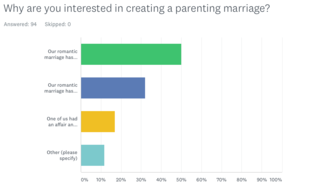Marriage
Give Your Spouse the Gift of a Parenting Marriage This Year
The perfect present for the spouse you're no longer in love with.
Posted December 10, 2017 Reviewed by Ekua Hagan
Key points
- A Parenting Marriage is a shift away from an emotion-based marriage to a purpose-based marriage—parents stay together in order to raise the kids.
- Those in a Parenting Marriage can come together as a family or have a separate social life apart from each other (which may include dating).
- Although it is on the cutting edge of social norms, some people feel that Parenting Marriages provide a more stable environment for their kids.

Are you just not feeling it with your spouse this holiday season?
Perhaps things have been a bit rough for you and your husband or wife for some time, and you're pretty "over it." You might even be thinking about filing for divorce come January.
Before you do anything rash, consider this alternative to divorce — especially if you have kids and you co-parent well —a Parenting Marriage.
This might be a good fit for you if you've been married for a long time, you both feel that the romantic love connection died long ago, you continue to go through the motions of being a family, and you long for a more fulfilled existence.
This alternative is a compromise between staying unhappily and divorcing, yet it draws from the best of both. That may sound funny since neither option is terribly good, but hear me out.
What Is a Parenting Marriage?
In a Parenting Marriage, you continue to raise your kids together in a stable environment. You continue to draw from one pool of money, and you don't have to double your expenses, as you would in a divorce. You have the option to come together as a family or have a separate social life apart from your spouse (which may or may not include dating, but that is one of the details you would work out between you). In a Parenting Marriage, you both get to see your kids every day. And, as one person said, "You get to avoid the loneliness of divorce."
In a nutshell, the shift you are making is one away from an emotion-based marriage to a purpose-based marriage. You will no longer expect to share mutual romantic love with your marriage partner. Instead, you can focus on the tasks and responsibilities of raising your children together.
Benefits of a Parenting Marriage
I have been helping couples make this very transition for over a decade, and I am seeing an amazing thing happen: Couples who felt helpless and hopeless that they would ever have a sense of peace and happiness until the kids had flown the coop are finding a new sense of freedom and excitement. Couples are no longer having to defer their happiness in order to avoid putting their children through splitting the family up, like living in two homes and all the social, financial, and familial stress that goes along with divorce.
Reasons for a Parenting Marriage
I keep tabs on why people are seeking out a Parenting Marriage. One question I have asked interested folks was: What do you hope to accomplish by transitioning to a Parenting Marriage? Here are some of the answers I received from a recent survey (these percentages add up to more than 100 percent because people could check more than one answer):
- 83 percent of respondents said they were choosing a Parenting Marriage in order to raise their children in a stable environment.
- 72 percent said that they wanted to do a Parenting Marriage to spare their kids from having to live in two homes.
- 28 percent said that they wanted to do a Parenting Marriage in order to ease into divorce (novel concept!).
- 18 percent of respondents said that they wanted to do a Parenting Marriage in order to save enough money to get divorced (another novel concept!).
Other answers people gave were, "the chance that maybe reconciliation could occur given time," "to explore how I really feel," "[to] get organized with my ex as a friend," "bring structure to the last remaining part of our relationship — parenting our special needs child [and remove] anger from the failure of the romantic marriage," and "give me a chance to reenter the workforce and establish myself after all these years as a stay-at-home mom."
Why Aren't Parenting Marriages More Common?
As you can see, a Parenting Marriage is a healthy alternative to divorce for many reasons. Given how obvious the benefits are, you may be wondering why it isn't more mainstream.
One answer is that the law doesn't recognize the Parenting Marriage concept. From the court's perspective, you are either married or at some stage of separation or divorce (this includes legal separation).
Another answer is that it's scary to do something on the cutting edge of cultural norms. The irony is that our society feels much more comfortable with people pretending to be happy than with people doing something out-of-the-box. By doing this, we encourage couples to not be authentic.
Addressing the legal issues may actually be easier than addressing the social and cultural concerns.
Couples who are worried about legal protections as they move away from being fully committed to their partner can implement a postnuptial agreement. In doing so, they actually kill two birds with one stone: They protect themselves in the present, and they prepare the way for divorce, making the dissolution process that much easier by sorting things out well ahead of time.
Couples concerned about what others will think can simply choose to not tell other people about their arrangement. This may not be as easy it sounds, however. For example, would you want to notify your children's teachers about your new arrangement and ask them to monitor how well the kids are adjusting to the transition? Do you, in fact, tell your kids? Do you tell other family members? What — if any — friends do you share this with?
Although there are still many unanswered questions — partly because you as a couple have to answer these for yourself — a Parenting Marriage is well worth exploring.
No part of this publication may be reproduced without the express written permission of the author. Failure to comply with these terms may expose you to legal action and damages for copyright infringement.




